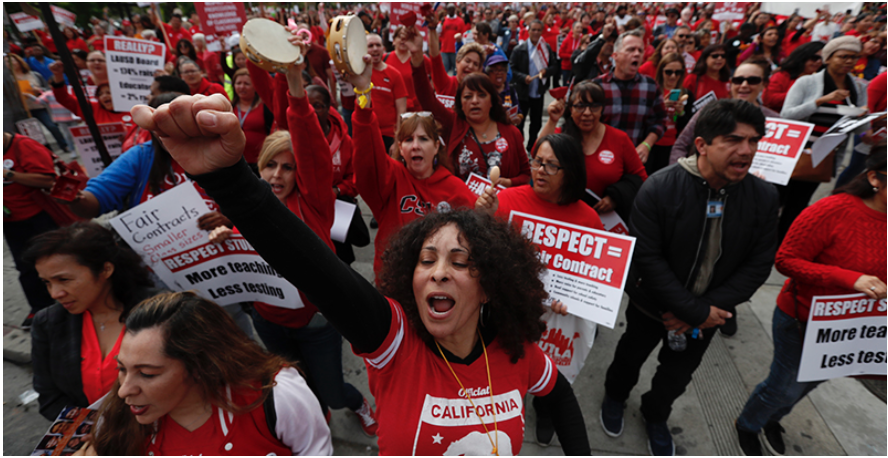CommentsCAPITAL & MAIN--It’s over. Following a 21-hour, all-night bargaining marathon, United Teachers Los Angeles president Alex Caputo-Pearl and Los Angeles Unified School District Superintendent Austin Beutner appeared with Mayor Eric Garcetti on Tuesday morning, the sixth day of the L.A. teachers’ walkout, to announce a tentative settlement of the first Los Angeles teachers strike in 30 years.
Teachers and their students will resume classes today.
Garcetti, who last Thursday locked the two sides into a City Hall room and, for the next five days, personally mediated the negotiations, called the agreement “historic.”
“You have to be fiscally responsive but you also, as the saying goes, sometimes have to make sure that your reach exceeds your grasp,” the mayor told the hastily assembled room of reporters and negotiating team members.
Both Beutner and Caputo-Pearl took up Garcetti’s historic significance theme, as each underscored what they considered their respective wins and emphasized the need to reverse the 40 years of disinvestment in California public schools triggered by the passage of Proposition 13 in 1978.
“That issue does not go away now that we have a contract,” Beutner noted. “The importance of this moment is public education is now the topic in every household in our community. Let’s capitalize on this. Let’s fix it.”
* * *
The real winner in the room was Caputo-Pearl, who cited district concessions on class-size reduction and on hiring more nurses, librarians and counselors as the biggest wins for the union, for LAUSD families and for the district itself. Over the last four years he had virtually rebuilt UTLA from the bottom up and forged new alliances with students, parents and the district’s Latino communities. By positioning the strike as a continuation of last year’s “red state teacher’s rebellion” and moving beyond salary issues, the union leader also succeeded in making the strike a national symbol for the threats posed to American public education.
“So, this is much more than a narrow labor agreement,” Caputo-Pearl emphasized. “It’s a very broad compact around things that get at social justice, educational justice and racial justice.”
Highlights include:
Core Issues
- Class Size Reduction: Elimination of the old contract’s “Section 1.5,” which had allowed the district to unilaterally raise class sizes; also includes year-by-year reductions to caps spelled out in the 2014-17 contract.
- Salary: A six percent increase, with three percent for the 2017-2018 school year and three percent for 2018-19.
- Community Schools: Thirty schools to be designated as community schools by June 30, 2020, with additional funding and a full-time community schools coordinator.
- Nurses & Librarians: Yearly increases to get a full-time nurse at every school and a full-time librarian at every secondary school by 2020-2021.
- Counselors: Seventeen additional full-time counselors by October 1, 2019, to maintain a counseling service ratio of 500-to-one per secondary school.
- Charter Co-Locations: Gives a UTLA member at each co-located school site a seat at the table to negotiate a shared-use agreement.
- Testing: A joint UTLA/LAUSD committee will develop a plan to reduce the number of assessments by 50 percent.
* * *
Common Good Issues
- Student searches: A pilot program ending random backpack searches will be expanded to 28 schools by the 2021-2022 school year.
- Green Space: A joint Green Space Task Force between LAUSD, UTLA and the City of L.A. will create a plan to increase green space on LAUSD campuses that includes bungalow and asphalt removal, and creating green play areas, water retention systems, and community school parks by December 2019.
- Immigrant Defense Fund: LAUSD will provide a dedicated hotline and attorney for immigrant families and will collaborate with UTLA for further services.
Perhaps the most remarkable, albeit symbolic win by UTLA negotiators, was to persuade Beutner to put a resolution for a charter school cap to a vote at the next LAUSD school board meeting. Although the resolution will certainly be voted down by the board’s pro-charter majority, for a superintendent who, only a month ago, had dismissed charter controversies as a “shiny distraction,” and who has been working behind the scenes on a plan that would accelerate charter growth through his “Re-Imagine LAUSD” plan, the concession’s symbolism is striking.
“We talked about charter schools and the importance of investing in existing schools, and really having accountability and regulation on charter schools, which is a part of this broader agreement,” Caputo-Pearl affirmed.
Afterwards, the UTLA president credited the contract breakthrough to the solidarity of the rank and file, as well as to assurances from Governor Gavin Newsom that LAUSD could expect further help from Sacramento. Those pledges included backing a union bill that would bring in more money by adjusting administrative ratios. And the governor has also agreed to statewide action on community schooling and to earmark more state funding for special education.
Newsom has already acted on at least another assurance to the union. On day one of the strike, he told reporters that he wants to see legislation on charter school transparency and accountability during this session. “I’m going to be advancing with a sense of urgency,” he vowed.
The deal immediately went before a closed session of the LAUSD school board and will get a formal vote next week. UTLA’s rank and file voted their approval on Tuesday night by what Caputo-Pearl described as a “vast supermajority.”
“What we were able to win in this agreement,” added Caputo-Pearl after the vote, “is a testament to you, our members, and you making a sacrifice by going on strike in order to improve the public education system for our students, our families and our communities.”
(Bill Raden is a freelance Los Angeles writer. This article was first posted first at Capital & Main.)
-cw
